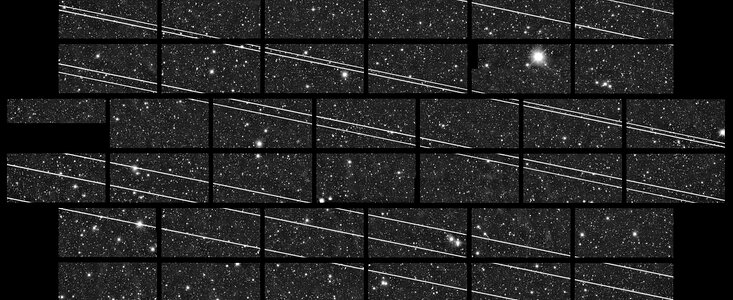Media advisory: Press Conference to Unveil Conclusions from Satellite Constellations 1 (SATCON1) Workshop
21 August 2020
On Tuesday 25 August, astronomers will release the final report from the Satellite Constellations 1 workshop during a virtual press conference hosted by the National Science Foundation’s NOIRLab and the American Astronomical Society (AAS). The briefing, to be conducted via Zoom, will begin at 2:00 pm US Eastern Daylight Time (18:00 UTC) and last 1 hour. Registration instructions appear below.
When SpaceX began launching clusters of 60 Starlink satellites in May 2019, astronomers reacted with alarm. Not only are the Starlink satellites brighter than anyone expected, but there could be tens of thousands more like them as companies in the rapidly growing commercial space industry strive to provide satellite-based communication services to underserved and remote areas. Constellations of bright satellites in low Earth orbit will fundamentally change ground-based optical and infrared astronomy and could impact the appearance of the night sky for stargazers worldwide.
SATCON1 gathered more than 250 astronomers, satellite operators, dark-sky advocates, and other stakeholders to discuss, understand, and quantify the astronomical impacts of large satellite constellations. The workshop report features two findings, ten recommendations, and four technical summaries and will be released to the public at the start of the briefing.
Briefing participants include:
- Connie Walker (NSF’s NOIRLab), SATCON1 co-chair
- Jeff Hall (Lowell Observatory), SATCON1 co-chair
- Lori Allen (NSF’s NOIRLab)
- Patrick Seitzer (University of Michigan)
- Tony Tyson (Univ. of California, Davis & Vera C. Rubin Observatory)
- Richard Green (Steward Observatory, Univ. of Arizona)
Registration
To register, go to http://bit.ly/satcon1. Upon approval, you will receive an email with instructions on how to connect via Zoom. The deadline to register is 12:00 pm EDT (16:00 UTC) on Tuesday 25 August.
Space at the press conference is limited. If we are not able to accommodate you on Zoom, you may watch the briefing live-streamed on the AAS Press Office YouTube channel, but you will not be able to ask questions.
More information
NSF’s National Optical-Infrared Astronomy Research Laboratory (NOIRLab), the US center for ground-based optical-infrared astronomy, operates the international Gemini Observatory (a facility of NSF, NRC–Canada, ANID–Chile, MCTIC–Brazil, MINCyT–Argentina, and KASI–Republic of Korea), Kitt Peak National Observatory (KPNO), Cerro Tololo Inter-American Observatory (CTIO), the Community Science and Data Center (CSDC), and the Vera C. Rubin Observatory. It is managed by the Association of Universities for Research in Astronomy (AURA) under a cooperative agreement with NSF and is headquartered in Tucson, Arizona. The astronomical community is honored to have the opportunity to conduct astronomical research on Iolkam Du’ag (Kitt Peak) in Arizona, on Maunakea in Hawaiʻi, and on Cerro Tololo and Cerro Pachón in Chile. We recognize and acknowledge the very significant cultural role and reverence that these sites have to the Tohono O’odham Nation, to the Native Hawaiian community, and to the local communities in Chile, respectively.
The American Astronomical Society (AAS), established in 1899, is the major organization of professional astronomers in North America. Its membership (approx. 8,000) also includes physicists, mathematicians, geologists, engineers, and others whose research interests lie within the broad spectrum of subjects now comprising the astronomical sciences. The mission of the American Astronomical Society is to enhance and share humanity’s scientific understanding of the universe, which it achieves through publishing, meeting organization, education and outreach, and training and professional development.
The SATCON1 workshop was supported by the National Science Foundation (NSF).
Links
Contacts
Amanda Kocz
Press and Internal Communications Officer
NSF NOIRLab
Cell: +1 520 318 8591
Email: akocz@aura-astronomy.org
Rick Fienberg
AAS Press Officer
Cell: +1 202 328 2010 x116
Email: rick.fienberg@aas.org






